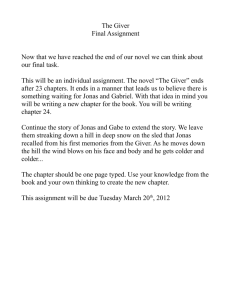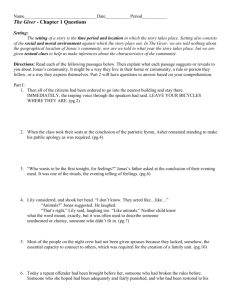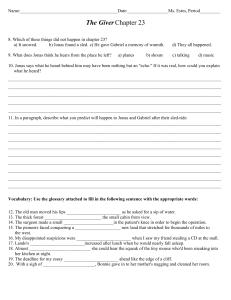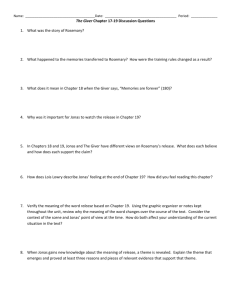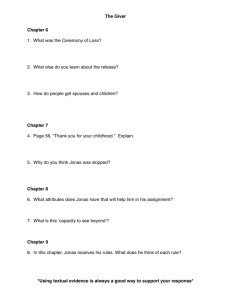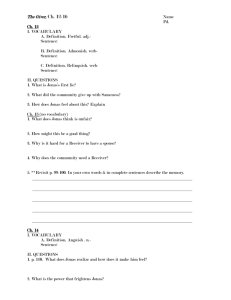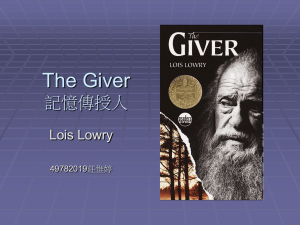File
advertisement
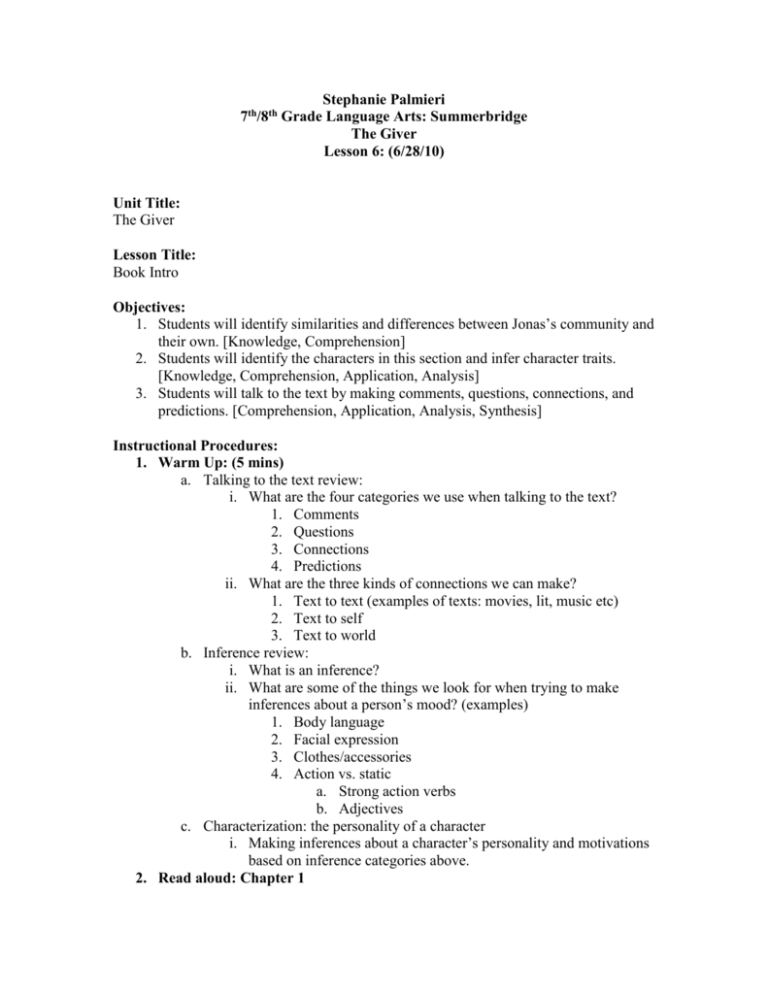
7th/8th Stephanie Palmieri Grade Language Arts: Summerbridge The Giver Lesson 6: (6/28/10) Unit Title: The Giver Lesson Title: Book Intro Objectives: 1. Students will identify similarities and differences between Jonas’s community and their own. [Knowledge, Comprehension] 2. Students will identify the characters in this section and infer character traits. [Knowledge, Comprehension, Application, Analysis] 3. Students will talk to the text by making comments, questions, connections, and predictions. [Comprehension, Application, Analysis, Synthesis] Instructional Procedures: 1. Warm Up: (5 mins) a. Talking to the text review: i. What are the four categories we use when talking to the text? 1. Comments 2. Questions 3. Connections 4. Predictions ii. What are the three kinds of connections we can make? 1. Text to text (examples of texts: movies, lit, music etc) 2. Text to self 3. Text to world b. Inference review: i. What is an inference? ii. What are some of the things we look for when trying to make inferences about a person’s mood? (examples) 1. Body language 2. Facial expression 3. Clothes/accessories 4. Action vs. static a. Strong action verbs b. Adjectives c. Characterization: the personality of a character i. Making inferences about a character’s personality and motivations based on inference categories above. 2. Read aloud: Chapter 1 a. I will be reading this chapter aloud in class. I will break it up into sections and create a different activity/goal for each section. b. Pages 1-4: (10 mins) i. Students will be asked to follow along while I read. They will have a copy of this section in front of them and can write on it directly. ii. Students will be asked to underline or highlight anything that seems odd or different from how we might act or think. iii. I will read section aloud: 1. What are some things that seem similar to our lives, or “normal?” a. Bike riding b. Morning anthem (like pledge of allegiance) 2. What are some things that seemed odd or different? a. Issuing public apologies b. Speaker system c. Being released 3. Who gets to decide what is normal? a. Individual b. Community c. Adults c. Pages 5-8 (10 mins) i. Characters: 1. Students will be prompted to pay careful attention to each character. a. After section: i. Students will be asked to write down (on front of packet) two words to describe each of the characters: 1. Jonas (protagonist) 2. Asher 3. Mother 4. Father 5. Lily ii. We learn the most about Jonas. Based on his actions and thoughts what inferences can we make about Jonas? What kind of person is he? d. Pages 8-9 (13 mins) i. Talking to the text: 1. After I read this section I will ask students to go back and reread it silently to themselves. Students will be asked to talk to the text and make at least: a. 1 comment b. 1 question c. 1 connection d. 1 prediction i. If you have never read this book before: what do you think the ceremony of 12 is? What does it involve? ii. If you have read this book before: make a clarification: knowing what you know, what seems odd this time around that you missed before? e. Share (especially questions) 3. Wrap Up: (7 mins) a. Start a list of Rules: i. Why do we have rules? ii. What seems odd about these rules? iii. What inferences can we make about this community based on the rules they have? 1. Very strict 2. Not a lot of choice but people seem happy 3. Talk through problems/conflict resolution iv. How do you think the rules will affect him as we continue through this story? b. Hand out books (sign out sheet) 4. Homework: a. Read chapter 2 b. Update rules list c. Talking to the text post its: 1 comment, question, connection, prediction/clarification Assessment: 1. Talking to the text and inference review 2. Section 1: odd vs. similar 3. Section 2: character traits 4. Section 3: talking to the text 5. Rules list/inferences Materials: 1. My book 2. Student books 3. Book sign out sheet 4. Copies of chapter 1 for talking to the text 5. Poster for rules list 6. Post its 7. Rules chart by chapter Lit/Writing/Social Studies Olha Chyshkevch Brandon Cruz Colleen Jeffries Zaria McKenzie Michellae Negron Phuc Nguyen Jasmine Rodriguez Hannah Selassie Victoria Velazquez Giovanny Zapata Lit/Writing/Social Studies Janaya Cupid Victoria Estremera Jose Gonzalez Desiree Harris Alyssa Heckman Aly Kenawy Daliswa Kumalo Marini Madawela Soohan Munoz Jullyssa Ramirez Cassandra Vazquez Book Number Rules List Chapter 1: Chapter 2: Chapter 3: Chapter 4: Chapter 5: Chapter 6: Chapter 7: Chapter 8: Chapter 9: Chapter 10: Chapter: 11 Chapter 12: Chapter 13: Chapter 14: Chapter 15: Chapter 16: Chapter 17: Chapter 18: Chapter 19: Chapter 20: Chapter 21: Chapter 22: Chapter 23: Rules that seem odd: Rules that are similar to our own: 7th/8th Stephanie Palmieri Grade Language Arts: Summerbridge The Giver Lesson 7: (6/29/10) Unit Title: The Giver Lesson Title: Characterization Objectives: 1. Students will extend peer comments, questions, predictions, and connections by responding to talking to the text post its. [Knowledge, Comprehension, Application, Analysis] 2. Students will identify rules from chapter 2 and differentiate between the concepts of “good” and “bad” using the rules as examples. [Comprehension, Application, Analysis, Synthesis, Evaluation] 3. Students will identify and interpret Jonas’s thoughts, feelings, speech, actions, and perceptions of him. [Comprehension, Application, Analysis, Synthesis, Evaluation] Instructional Procedures: 1. Warm Up: (10 mins) a. Students will put their talking to the text post its on the back board in categories. i. Questions ii. Predictions iii. Comments iv. Connections b. Students will select one of each (not their own) c. On the back of chapter 1 packet, students will respond/talk to the text about the post its they picked. i. Answer a question or ask a related question. ii. Agree or disagree with a prediction. Find textual proof to support your argument. iii. Make a comment iv. Make a connection d. Share 2. Rules List: (5-7 mins) a. What new rules did you find while reading? b. What rules can we infer? i. 50 children born per year (11) ii. Parents must apply for children (12) iii. The Naming: (11-12) iv. Cannot find out names of Ones before the ceremony (12) v. No bike riding until age 9 when you receive a bike at the ceremony of Nine (13) c. Do these rules seem good or bad? Why? i. What does it mean for something to be good or bad? ii. Can something ever be just good or just bad? 3. Characterization: (10 mins) a. Character descriptions: i. Powerpoint on smartboard: 1. Contains three slides with different characters a. Harry Potter b. Bella c. Spiderman 2. Each slide has a description (physical/personality) for each character 3. Students will be asked to guess who the character is. ii. What kinds of details did I include in my description of the characters that helped you to identify who they were? 1. Actions 2. Physical appearance 3. What they say 4. How other’s see them/think about them b. Elements of characterization i. Character’s appearance ii. Character’s actions iii. Character’s thoughts iv. Character’s speech/dialog v. Reactions of others 4. Jonas Characterization: (15 mins) a. Thinking/feeling/saying: Chapters 1 and 2 i. What does Jonas look like? ii. What actions is Jonas taking? iii. What is Jonas thinking? iv. What is Jonas saying? v. How do other character’s react to Jonas? 5. Wrap Up: (5 mins) a. Describe Jonas’s character: i. Thoughtful, serious, sympathetic, introspective etc b. Based on what you know about Jonas, make an inference about how he would act if he was sitting in our classroom right now. i. What would his body language look like? 1. Arms/hands 2. Slouching vs. sitting upright ii. Facial expression 1. Eyes 2. Mouth 3. Eyebrows iii. Clothing/Accessories 6. Homework: a. Read chapter 3 b. Tracking rules c. Reading quiz tomorrow Assessment: 1. Post its 2. Post it response 3. Rules list 4. Characterization power point 5. Jonas’s characterization worksheet 6. Inferences Materials: 1. Rules list 2. Power point 3. Jonas Characterization worksheet My copy: Rules: 1. No pilots can fly over the community (1) 2. If you break a major rule you will be released (2) 3. Morning message chant (3) 4. Public apology for small wrongdoings (3) 5. Nightly telling of feelings in family unit (5) 6. School play rules (5) 7. Release that isn’t punishment: elderly, infants (7) 8. Every adult has a job assigned to them (7-8) 9. Spouses are assigned (8) 10. Two children per family: 1 male, 1 female (8) 11. Three major transgressions = release (9) 12. 50 children born per year (11) 13. parents must apply for children (12) 14. The Naming: (11-12) 15. Cannot find out names of Ones before the ceremony (12) 16. No bike riding until age 9 when you receive a bike at the ceremony of Nine (13) 17. Mandatory volunteer hours (15) Start at Eight (22) 18. Twelves spend more time with cohort and less time with friends (17) 19. Comfort objects taken away at Eight (18) 20. Designated birthmothers (20) three years/three births then physical manual labor for life (22) 21. Females under nine: must wear hair ribbons and keep them tied (22) 22. No bragging (27) 23. No rudeness (27) 24. Adults can not look at each other’s “nakedness” except for the young and the old. (30) 25. Morning ritual: dream telling (34) starts at three (35) 26. Report stirrings/get treatment (37) 27. Sevens get front button jackets (40) 28. Hair change at 10 (46) 29. New clothes at 11 (47) 30. Can apply to be released to Elsewhere (48) 31. Chief elder: leader of community, elected every 10 years. (51) 32. Smacking for small children (54) 33. Receiver in training cannot be observer, cannot be modified (61) Characterization The Giver: Chapters 1 and 2 What is Jonas Saying? What is Jonas Thinking? What does Jonas look like? What actions is Jonas taking? How do other character’s react to Jonas? 7th/8th Stephanie Palmieri Grade Language Arts: Summerbridge The Giver Lesson 8: (6/30/10) Unit Title: The Giver Lesson Title: Characterization Objectives: 1. Students will compare and contrast Jonas and Lily’s character through a venn diagram. [Knowledge, Comprehension, Application] 2. Students will make inferences about Jonas and Lily and evaluate how those characters would act in a different setting. [Application, Analysis, Synthesis, Evaluation] Instructional Procedures: 1. Warm Up: (5 mins) a. Reading quiz i. Go over questions (15 mins) 1. Read “eye” passage: a. Birthmother: what does this idea indicate about how this community functions? i. There are designated birthmothers. ii. Blood relations don’t matter. iii. Children are adopted into families. 2. Read “depth” passage: a. Introduce literary device: foreshadowing. i. What is foreshadowing? 1. Author is giving us clues about what is coming. ii. Predictions: what could this image be foreshadowing and for who? 3. Inferences about Jonas’s feelings 4. Birthmother: a. why does this job appear good to Lily? b. Why does her mother explain it as a difficult occupation? c. Inference: do people in the community have a choice when it comes to jobs? 5. What “change” do you think Jonas sees? 6. How is discipline enforced (what does this word mean?) in the community? a. Do you think there is anything odd about the way discipline is enforced? 2. Character compare and contrast (10 mins) a. Students will brainstorm (using a web diagram or outline) characterization for Lily and for Jonas using the categories we talked about yesterday (Appearance, actions, thoughts, speech, other’s perceptions) b. Venn Diagram i. Students will draw a venn diagram in their notes and compare and contrast these two characters. c. I will put the diagram on the board. i. Similarities: 1. Both children 2. Part of the same family unit 3. Had comfort objects ii. Differences: 1. Jonas: a. Thoughtful b. More calm and rational c. Precise d. 6th sense: is aware of differences and begins to contemplate implications e. pale eyes 2. Lily: a. Irrational b. Naïve c. Immature 3. Writing: (10 mins) a. Pick either Jonas or Lily b. Using what you know about this character imagine what their favorite place would be in our world/culture. c. Write a descriptive paragraph about how Jonas or Lily might act in that place. i. What would they say? ii. What would they do? iii. Who would they interact with? iv. What would those interactions look like? 4. Wrap Up: (5 mins) a. Volunteers to share writing i. Why did you pick that place (textual evidence to support reasoning) ii. What inferences did you have to make about this character in order to imagine how they would act somewhere else? iii. What traits did your character display in this piece? b. Voice: i. In what ways did this reader create a strong voice both through writing and reading the piece? 5. Homework: a. Read chapter 4 b. Rules List Assessment: 1. Reading Quiz 2. Class discussion 3. Character compare and contrast 4. Venn diagram 5. Writing Materials 1. Reading Quiz 2. Books 3. Notebook paper NAME_________________________ The Giver: Reading Quiz Chapter 3 1. What two people have “funny” eyes like Jonas? 2. How does Jonas feel when his sister mentions his “funny” eyes? 3. Why does Jonas feel this way? 4. What animal is the newchild’s comfort object? 5. What are the terms of being a birthmother? a. 5 years and 5 births, then retirement b. 3 years and 3 births, then physical labor c. 5 years and 3 births, then retirement d. 5 years and 3 births, then librarian 6. At what age do children in the community start volunteer hours? a. 6 b. 8 c. 10 d. 12 7. Jonas recalls an incident in which he is playing catch with Asher. The object they are playing with “changes.” What is the object? 8. After taking this object home how is Jonas scolded? 7th/8th Stephanie Palmieri Grade Language Arts: Summerbridge The Giver Lesson 9: (7/1/10) Unit Title: The Giver Lesson Title: Setting Objectives: 1. Students will identify and infer rules of Jonas’s community. [Knowledge, Comprehension, Application] 2. Students will identify the elements of setting in a video clip. [Knowledge, Comprehension, Application] 3. Students will illustrate a scene from chapter 4 and justify their choices. [Application, Analysis, Synthesis, Evaluation] Instructional Procedures: 1. Warm Up: (5-7 mins) a. Take out rules list b. Share the rules you found or inferred from chapters 3 and 4. i. We will update as a class on our class list. 1. Mandatory volunteer hours (15) Start at Eight (22) 2. Twelves spend more time with cohort and less time with friends (17) 3. Comfort objects taken away at Eight (18) 4. Designated birthmothers (20) three years/three births then physical manual labor for life (22) 5. Females under nine: must wear hair ribbons and keep them tied (22) 6. No bragging (27) 7. No rudeness (27) 8. Adults cannot look at each other’s “nakedness” except for the young and the old. (30) 9. Morning ritual: dream telling (34) 2. Setting Introduction: (15 mins) a. What is setting? (start broad and get specific) i. place - geographical location. Where is the action of the story taking place? ii. time - When is the story taking place? (historical period, time of day, year, etc) iii. weather conditions - Is it rainy, sunny, stormy, etc? iv. social conditions - What is the daily life of the characters like? Does the story contain local color (writing that focuses on the speech, dress, mannerisms, customs, etc. of a particular place)? v. mood or atmosphere - What feeling is created at the beginning of the story? Is it bright and cheerful or dark and frightening? b. I will play a clip from Pirates of the Caribbean (http://www.youtube.com/watch?v=qFG6KAd2ITI&feature=related) i. Students need no prior knowledge of this movie, except that the characters are pirates. vi. Students will watch the clip one time through vii. I will play the clip again, except this time I will ask students to write down any parts of the setting they can identify (on chart). 1. Focusing on Captain Jack Sparrow viii. Elements: 1. Place: England, Ocean, boat, dock 2. Time: Late 1800’s, mid-day 3. Weather conditions: clouds with sun glowing through, sunny, seems warm 4. Social conditions: pirate clothing/soldier clothing (ornate, billowy), accents, proper speech/pirate lingo 5. Mood: upbeat and silly, hopeful a. How does the music affect/change the way we perceive mood? b. How does a shift in setting/images we get introduced to (pirates hanging) change the mood? c. How do new characters change the mood? 3. Illustration: (15 mins) a. Re-read mid page 29-mid page 30 silently to yourself b. Illustrate this setting i. What is the mood like? 1. What kinds of colors should you use to portray that mood? Why? 2. How do the people in this scene (Jonas, elderly, friends) dictate the mood? 3. How is the discomfort of nakedness offset? ii. Make some inferences about the kinds of objects that might appear in this setting. iii. What kinds of clothing are the characters wearing? 4. Wrap Up: (5-7 mins) a. Share with a partner b. Share with the class i. Describe your choices. What evidence from the book do you have that supports your choices? Assessment: 1. Rules share 2. Setting identification 3. Illustration 4. Illustration share Materials: 1. Class rules list 2. Setting definition/chart sheet 3. Youtube clip 4. Paper for illustration 5. Books Setting o Place - geographical location. Where is the action of the story taking place? o Time - When is the story taking place? (historical period, time of day, year, etc) o Weather conditions - Is it rainy, sunny, stormy, etc? o Social conditions - What is the daily life of the characters like? Does the story contain local color (writing that focuses on the speech, dress, mannerisms, customs, etc. of a particular place)? o Mood or atmosphere - What feeling is created at the beginning of the story? Is it bright and cheerful or dark and frightening? Place Time Weather Conditions Social Conditions Mood
